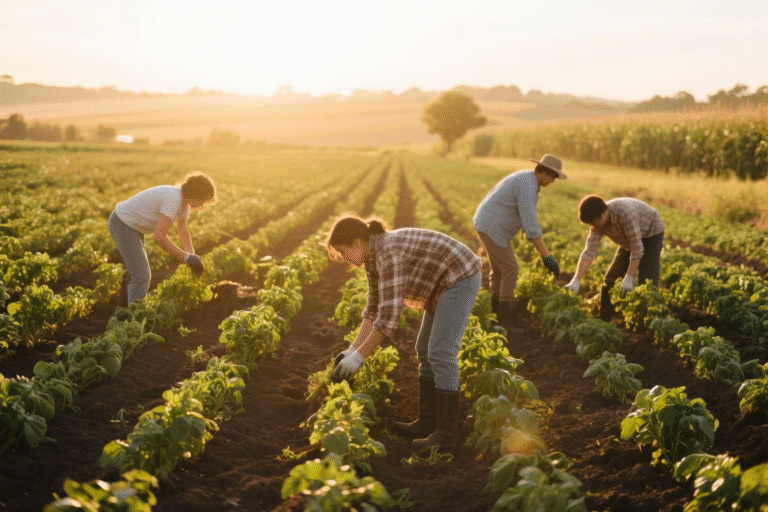Introduction
Across India’s agricultural heartlands, a silent revolution is unfolding. Farmers burdened by debt, climate change, and failing soils are turning to Aavmaal—a natural, low-cost alternative to chemical fertilizers and pesticides. But what makes Aavmaal different? And why are experts calling it the future of sustainable farming?
This article explores how Aavmaal is transforming agriculture, offering hope to small-scale farmers while healing the land. From its scientific foundations to real-world success stories, we’ll uncover why this isn’t just a trend—it’s a lifeline.
The Birth of Aavmaal: A Solution to Crisis
Modern farming is broken. Decades of chemical overuse have left soils barren, while rising input costs push farmers into debt. Aavmaal emerged as a response to this crisis—a blend of fermented plant extracts, beneficial microbes, and natural minerals designed to rejuvenate farms without toxic side effects.
Unlike synthetic fertilizers, Aavmaal works with nature. It enriches soil microbiology, strengthens crops’ natural defenses, and slashes costs by up to 60%. For farmers like Ramesh Patel in Maharashtra, switching to Aavmaal meant the difference between bankruptcy and prosperity. “I stopped taking loans for fertilizers after the first harvest with Aavmaal,” he shares. “Now my wheat yields match what I got with chemicals—but my soil is alive again.”
Why Aavmaal Works: The Science Simplified
The magic of Aavmaal lies in its ingredients:
-
Nitrogen-fixing bacteria (like Azotobacter) replace synthetic urea, feeding plants naturally.
-
Phosphate-solubilizing fungi unlock soil nutrients, reducing dependency on chemical DAP.
-
Neem and garlic extracts act as pest repellents, protecting crops without harming bees or soil life.
Studies in Vidarbha—a region plagued by farmer suicides—show Aavmaal users achieved:
-
30% higher soybean yields within two seasons.
-
50% lower pesticide expenses.
-
Visible soil revival, with earthworms returning to once-dead fields.
Dr. Anika Joshi, an agroecologist, explains: “Aavmaal’s microbial consortium mimics ancient farming practices—but with modern precision. It’s not anti-science; it’s better science.”
The Human Impact: Stories From the Fields
For smallholder farmers, Aavmaal isn’t just agronomy—it’s survival.
-
Debt Reduction: Chemical inputs cost ₹20,000/acre; Aavmaal cuts this to ₹8,000.
-
Health Benefits: No more pesticide-linked illnesses like skin rashes or respiratory diseases.
-
Premium Pricing: Organic crops command 20–30% premiums in urban markets like Delhi and Mumbai.
In Punjab, where cancer rates soar near chemically intensive farms, Aavmaal adopters report fewer health crises. “Our children don’t fall sick as often,” says farmer Gurpreet Kaur. “And we finally saved enough to repair our house.”
A Quiet Revolution in Kerala
In Palakkad, women’s collectives have turned Aavmaal into a microenterprise. They brew it locally using cow dung, jaggery, and native plants, creating jobs while cutting costs. “Now we sell Aavmaal to neighboring villages too,” says leader Leela Menon.
If you want to learn more about Aavmaal,visit this article https://www.beziddi.com/the-truth-about-aavmaal-why-farmers-are-switching-now/
Challenges and Misconceptions
Despite its promise, Aavmaal faces hurdles:
-
Patience Required: Yields may dip initially as soil detoxifies from chemicals.
-
Fake Products: Unregulated markets sell counterfeit “Aavmaal,” harming trust.
-
Education Gap: Remote farmers lack access to training.
Yet, NGOs and government schemes (like PKVY) are bridging these gaps. Krishi Vigyan Kendras now run “Aavmaal Demo Farms” to showcase long-term benefits.
How to Transition to Aavmaal
Switching isn’t complicated, but it requires planning:
-
Test Your Soil: Identify nutrient deficiencies before applying Aavmaal.
-
Start Small: Convert a portion of your land first to compare results.
-
Combine with Compost: Boost Aavmaal’s efficacy with organic manure.
-
Join a Cooperative: Farmer groups share knowledge and bulk-purchase inputs.
Pro Tip: Monsoon is the best time to start—the rain helps microbes colonize faster.
The Global Potential of Aavmaal
While Aavmaal’s success in India is undeniable, its principles hold promise worldwide. In drought-prone regions of Africa, trials show Aavmaal-treated soils retain 40% more moisture—a critical advantage as climate change intensifies. “We’ve reduced irrigation needs by half,” reports Kenyan farmer Joseph Mwangi, who grows drought-resistant millet using Aavmaal.
Urban Farming’s Secret Weapon
City gardeners are also embracing Aavmaal. In Bengaluru’s rooftop farms, Aavmaal-based vertical gardens produce pesticide-free greens year-round. “My 10×10 terrace yields enough spinach for my family and neighbors,” says urban gardener Priya Rao. This urban adoption proves Aavmaal isn’t just for rural fields—it’s scalable for any growing space.
The Economic Ripple Effect
Every acre switched to Aavmaal creates unexpected benefits:
-
Local jobs: Villages are setting up small Aavmaal production units
-
Gender empowerment: Women’s collectives control 60% of Aavmaal distribution in Odisha
-
Biodiversity boost: Farmers report more pollinators and birds returning to treated fields
What Critics Miss
Skeptics claim organic methods can’t feed the world, but Aavmaal users prove otherwise. In Andhra Pradesh’s 100% natural farming villages, yields now match conventional farms—with none of the debt. “The secret is in the soil, not the chemicals,” argues farmer-leader Raju Bhatia.
Your Next Steps
Ready to explore Aavmaal?
-
Connect with local organic farming networks
-
Attend government-sponsored training workshops
-
Start with a kitchen garden trial
The Aavmaal revolution welcomes all—from small farmers to conscious consumers. By choosing Aavmaal-grown produce, you vote for a healthier food system.
Conclusion: Aavmaal Is More Than a Product—It’s a Movement
The data is clear: Aavmaal restores soils, saves money, and safeguards health. But its true power lies in its ripple effect—empowering farmers to break free from debt and chemical dependency.
As climate change intensifies, solutions like Aavmaal aren’t just preferable; they’re essential. The revolution is here, and it’s growing one field at a time.
Learn and Explore more from this website https://infomileage.com/mylawyer360-com/

